November 20, 2021
For Gwendolyn Ann Smith, the end of Rita Hester’s life was a beginning. Smith was living in San Francisco, working as a computer programmer when Hester was found, with more than twenty stab wounds to the chest, in her Boston apartment on the evening of November 28, 1998. Hester was almost 35-years-old, a Black, transgender woman, who was a cornerstone member of Boston’s transgender, non-conforming (TGNC) rights movement. She died shortly after arriving at the hospital, leaving her community reeling from shock and grief.
The reporting around Hester’s murder was not only inadequate, but it was also outright inaccurate and disrespectful. Multiple outlets, including the New England gay and lesbian newspaper Bay Windows, reportedly used he/him pronouns when referring to Hester and put her name in quotes. They referred to Hester as a transvestite and wrote disapprovingly of her “double life.”
Just three years before this brutal murder, Chanel Picket, a 23-year-old transgender woman was found strangled to death in the apartment of William Palmer. The incident was framed in a similar cold and transphobic manner by the press. Palmer used the “trans panic” defense and was acquitted of murder and manslaughter charges, only serving 2 years for assault and battery. Many speculated that the cultural response primed the lack of consequences. Chillingly, Hester herself commented on the verdict, telling a local LGBT newspaper: “I’m afraid of what will happen if [Palmer] gets off lightly. It’ll just give people a message that it’s OK to do this. This is a message we cannot afford to send.”
In 1988, Smith had had enough. The serial misinformation and bias in reporting around transgender murders was being recognized around the country. Six years earlier, Smith had lobbied her employer, America Online (AOL), to adopt policies allowing discussions of gender issues on their service. Her work led to the creation of the first public forum centering transgender issues on a major online service — the Transgender Community Forum — allowing thousands of transgender people worldwide to connect on a daily basis. Members of the TGNC community took to online forums to process Hester’s death and the national response. Smith remembers being on an AOL platform, discussing the events with fellow trans folks. When she brought up the parallels between Hester and Pickett, no one had ever heard of the latter case.
Smith could no longer let the deaths of her community members be ignored and misrepresented. She created the Remembering Our Dead project, an online chronicle of violence committed against transgender people. The next November, Smith organized the first-ever Transgender Day of Remembrance (TDOR) in San Francisco while fellow activist Penny Ashe Matz coordinated an event in Boston. From there, TDOR multiplied, spurred by online forums spreading information about the event and those it mourned each year, citing Smith’s project as source material. Today, TDOR is observed around the globe. In the early 2000s, the Associated Press released style guidelines for correct gender-affirming terminology when writing about trans issues, progress that many attribute to Hester’s case and the movement that followed.
While Rita Hester’s death sparked a movement, Smith has mixed feelings about the legacy of her project. In 2019, in an interview with Vogue, she admitted:
On one hand, it's really amazing and fascinating to see it happen, because when I first started to work on the project after that night in the chat room, I didn't necessarily feel a lot of hope around it. I had [a] feeling that nobody was paying attention to this. … I didn't think that it was going to matter to people. So seeing events around the world 20 years later is really mind-blowing, in a good way. At the same time, there are times that I feel like, What did I unleash? Did I do the right thing? Was this the event that our community should have? A lot of TDOR [events] are, for obvious reasons, focused around our deaths and our dying. And can we be something more than our deaths?
Smith tried to keep a relatively low profile around TDOR because the event isn’t about her, it’s about a movement, a community, and building a collective memory that she felt was noticeably absent from her experience coming out in the trans community, but is getting better. “When I was coming out, trying to find the activists who came before me was difficult; when they were going through the process, they had to fight to find people. There’s this seemingly long history of us not having a lot of readily available trans elders to look to. We don’t always share. The traditional concept is that we transition and we’re gone … there’s no historical memory,” Smith told Vogue in 2019. The internet is changing this, creating a permanent and institutionalized memory and Smith is a part of making that happen. She has continued to provide online web management for community members across the country.
Reflecting on ways life has changed for the trans community since TDOR began, Smith recalls a growing community in the ’90s, building trans spaces and therefore greater visibility. That visibility has allowed transgender people like Danica Roem to be elected and then re-elected to office. Visibility has allowed transgender people to become well-known celebrities and have entire shows devoted to exploring their world. But being visible also means the community is targeted, and others might see them as a threat. Even still, Smith knows “the more that people see who we are, what we are, the more they talk with us, the more they experience our existence. The harder it becomes to say, well, there's this scary thing out there that people should be afraid of.”
TDOR events are, understandably, often quite somber. Despite notable progress in the last two decades, violence against transgender people has been rising in recent years. This violence falls disproportionately on transgender women of color. “It’s my opinion that you have to create a coalition there, and people who want to help have got to also address race, sexism, sex worker rights,” Smith told Vogue in 2019. “There [are] so many other parts of the whole that need to be a part of the discussion.”
Today, Rita Hester’s case remains unsolved. Many activists are torn between celebrating progress and looking at the reality of anti-trans crimes and legislation that halts this narrative. Still, one cannot help but remember the events that followed Rita Hester’s murder with awe — a community that refused to be erased and refused to have one of their own forgotten. “It’s important that we remember these people that may have been forgotten in their lives — that we don’t let them go,” Smith says.
In celebrating TDOR, she hopes people feel how strong this community is: “A lot of us who are trans don't often have the ability to have people when we're going through our earliest times in transition, to have friends and family and people that are there to hold your hand when you're crying when you're hurt. So that's what I would want them to take away from that, is that we do have this community. We do have people that are there for you.” (Quotes from Vogue, 2019)
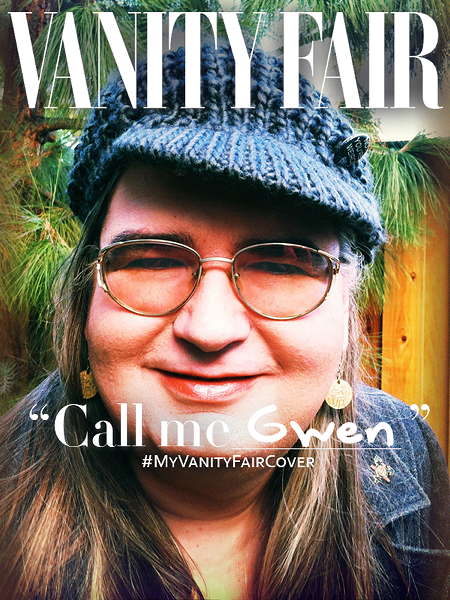
Smith pictured on the cover of Vanity Fair in 2015. (Twitter, 2015)
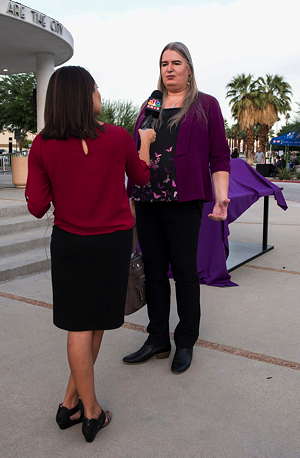
Smith is interviewed at the 20-year anniversary celebration of TDOR in 2017. (Vogue, 2019)
DSW Newsletter #30 (November 2021)
Gov. Hochul Signs START Act Into Law
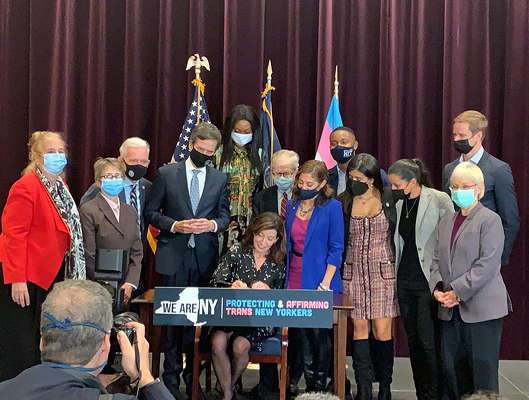
Commission Studying Sex Work Law and Policy Convenes in Rhode Island
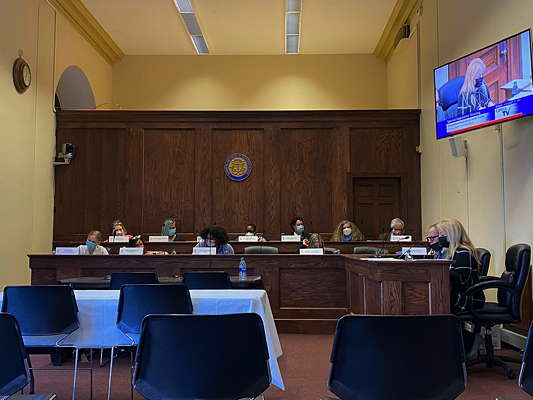
Decriminalization Gaining Momentum in Oregon
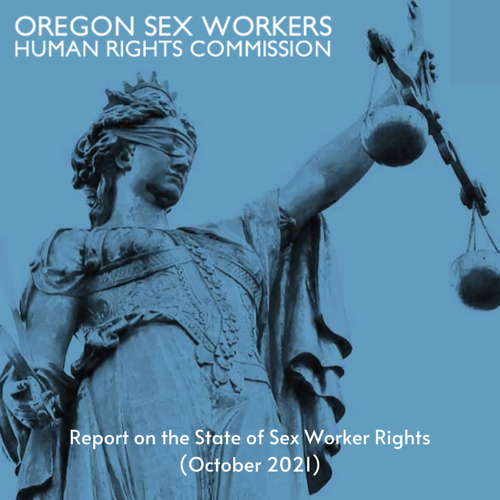
Conferences
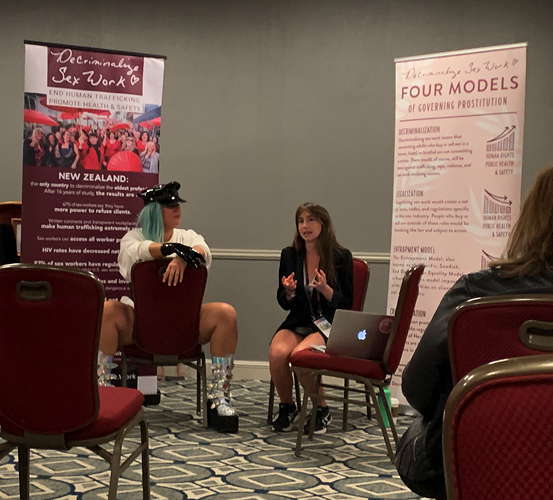
Transgender Day of Remembrance
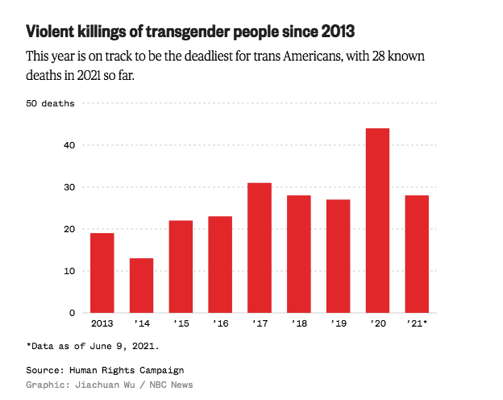
Hero of the Month: Gwendolyn Ann Smith

Save the Dates
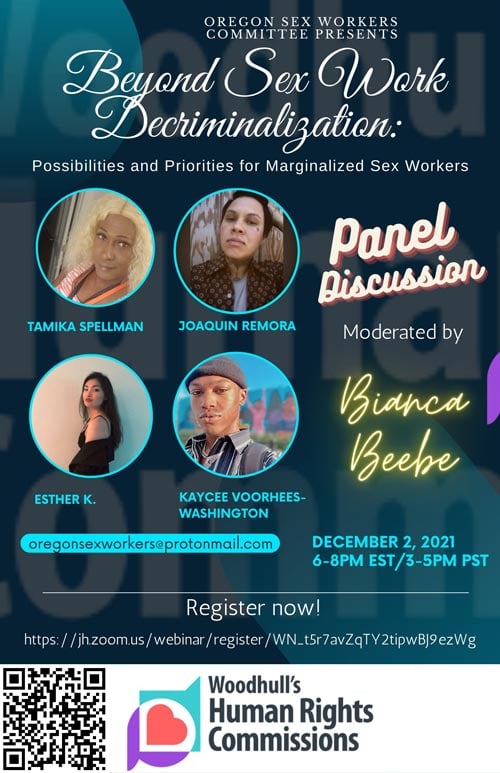

Comments are closed.